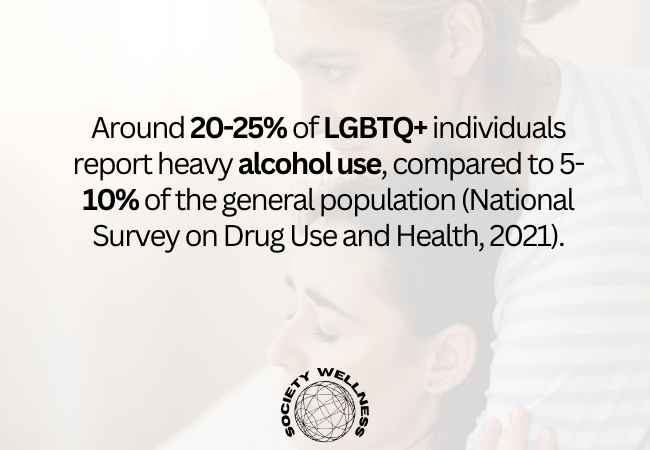Substance abuse often masks deep-seated pain, stress, or trauma, and for many LGBTQ+ individuals, the challenges of societal stigma, discrimination, and minority stress can exacerbate the need to self-medicate. However, quitting alcohol and drugs can bring profound improvements in every aspect of life—physical, emotional, mental, and social. At LGBTQ Addiction Centers, we offer tailored, affirming care to support you through this life-changing process.
Physical Health Improvements Through Sobriety
One of the first noticeable benefits of quitting alcohol and drugs is the improvement in physical health. Prolonged substance use can damage nearly every system in the body, but recovery starts as soon as you stop using.
- Improved Organ Function: The liver, heart, and brain begin to heal after substance use stops. For example, quitting alcohol reduces the risk of liver cirrhosis and heart disease.
- Restoration of Energy Levels: Without substances disrupting your sleep cycle, your energy naturally returns. Quality sleep becomes consistent, allowing your body to recharge.
- Stronger Immune System: Substances suppress the immune system, making the body more vulnerable to infections. Sobriety helps the immune system regain strength.
- Healthier Appearance: The toxins from substances negatively affect the skin, hair, and overall physical presentation. After quitting, clearer skin, reduced puffiness, and a healthier glow are common improvements.
Programs like our LGBTQ Day Treatment Program and LGBTQ Evening Outpatient Program provide medical support and guidance during the early stages of recovery, ensuring your body has the tools it needs to heal.
Mental and Emotional Healing After Addiction
Substance use often worsens or masks underlying mental health conditions such as depression, anxiety, or PTSD. For LGBTQ+ individuals, these issues can stem from experiences of rejection, trauma, or societal pressure. Quitting substances allows the healing process to begin.
- Enhanced Cognitive Function: Addiction can impair memory, focus, and decision-making. With sobriety, the brain starts to recover its natural balance, improving your ability to think clearly and process emotions.
- Mood Stability: Alcohol and drugs often lead to emotional highs and lows. Quitting enables a more stable emotional state, reducing the frequency and intensity of mood swings.
- Reduced Anxiety and Depression: Sobriety allows evidence-based treatments, such as Cognitive-Behavioral Therapy (CBT) and Dialectical Behavior Therapy (DBT), to address co-occurring mental health disorders effectively.
- Healing from Trauma: Many LGBTQ+ individuals turn to substances to cope with past traumas. Through comprehensive therapy, you can confront and process these experiences in a safe, affirming environment.
Our LGBTQ Mental Health Programs combine addiction treatment with mental health care to address these overlapping challenges, ensuring you heal on every level.
Rebuilding Social Connections
Substance use often isolates individuals from loved ones, straining relationships and leaving feelings of loneliness and regret. Sobriety offers a chance to heal these connections and foster new, meaningful ones.
- Repairing Trust: Addiction can erode trust in relationships with family, friends, and partners. Through honesty and consistent effort in recovery, you can rebuild this trust and restore closeness.
- Improved Communication: Sobriety enhances emotional regulation, making it easier to have open, productive conversations and resolve conflicts.
- Strengthening LGBTQ+ Support Networks: Being part of a supportive community is vital for long-term recovery. LGBTQ-specific group therapy creates a safe space for sharing experiences, fostering connections, and building lasting friendships.
- Creating Healthy Boundaries: Recovery also teaches the importance of setting boundaries to protect your sobriety and well-being, ensuring your relationships remain supportive and positive.
Repairing and Strengthening Relationships
Substance abuse can erode trust and damage relationships with friends, family, and partners. Recovery provides an opportunity to rebuild these connections with honesty and integrity.
- Rebuilding Trust: By prioritizing sobriety, you demonstrate commitment and reliability, allowing loved ones to trust you again.
- Improved Communication: Sobriety enables better emotional regulation and conflict resolution, making relationships healthier.
- Finding Supportive Communities: LGBTQ-specific group therapy fosters understanding and mutual encouragement, helping you connect with others who share your experiences.
- Self-Acceptance: Embracing sobriety allows you to rediscover your authentic self and build stronger relationships, both with yourself and those around you.
At LGBTQ Addiction Centers, our LGBTQ Addiction Treatment Programs create a safe space for personal growth and connection, helping you repair relationships while fostering new ones.
Rediscovering Purpose and Identity
Substance abuse often clouds one’s sense of self, leading to a loss of direction and purpose. Sobriety brings the clarity needed to reconnect with your authentic self and create a fulfilling life.
- Pursuing Passions: In recovery, you have the opportunity to rediscover hobbies and interests that bring you joy. Whether it’s art, fitness, or activism, finding your passions can make life more rewarding.
- Achieving Goals: Substance abuse can derail educational, career, and personal goals. Sobriety allows you to refocus your efforts and work toward a future you’re proud of.
- Embracing Your Authentic LGBTQ+ Identity: Many LGBTQ+ individuals struggle with self-acceptance, often using substances to cope with societal stigma or internalized shame. Recovery helps you embrace your true self with pride and confidence.
- Finding Joy in Sobriety: Without the numbing effects of drugs or alcohol, you can experience genuine emotions and find happiness in everyday moments.
Breaking Free from the Cycle of Stress and Stigma
For LGBTQ+ individuals, societal stigma and minority stress often drive substance use. Sobriety provides the freedom to address these challenges in healthier, more productive ways.
- Healthy Coping Mechanisms: Quitting alcohol and drugs allows you to develop effective tools for managing stress, such as mindfulness, therapy, and physical activity.
- Building Resilience: Overcoming addiction fosters confidence and resilience, empowering you to face life’s challenges with strength and self-assurance.
- Safe, Affirming Care: Our LGBTQ Night Treatment Program ensures you feel validated and supported throughout your recovery journey, helping you overcome unique stressors tied to your identity.
Rediscovering Your Authentic Self
Substance use often causes individuals to lose sight of their passions, purpose, and identity. Sobriety provides the clarity and freedom to reconnect with your true self.
- Pursuing Goals: Without the cloud of addiction, you can focus on achieving personal and professional aspirations.
- Discovering Joy: Recovery allows you to find genuine happiness in relationships, hobbies, and daily life.
- Embracing Your Identity: LGBTQ-specific care ensures that your identity is celebrated and supported, allowing you to thrive authentically.
At LGBTQ Addiction Centers, we celebrate every aspect of your journey, helping you reclaim your life and rediscover the joy of living authentically.
Why Choose LGBTQ Addiction Centers for Your Recovery Journey?
At LGBTQ Addiction Centers, we understand that addiction recovery is not one-size-fits-all. That’s why we offer:
- Tailored LGBTQ Addiction Treatment Programs that address the unique challenges of the LGBTQ+ community.
- Evidence-based therapies like Cognitive-Behavioral Therapy and Dialectical Behavior Therapy for mental health support.
- Flexible options, including Day Treatment, Evening Outpatient Programs, and Night Treatment Programs, to fit your needs and schedule.
- A compassionate, affirming environment where your experiences and identity are honored.
Take the First Step Toward Sobriety
Quitting alcohol and drugs is about more than just stopping use—it’s about reclaiming your health, happiness, and future. At LGBTQ Addiction Centers, we are here to guide you every step of the way with expert care, support, and understanding.
Conclusion
Quitting alcohol and drugs is not just about letting go of harmful substances; it’s about reclaiming your life, health, and identity. Sobriety offers profound physical and mental health benefits, strengthens relationships, and allows you to rediscover your passions and purpose. For LGBTQ+ individuals, the journey to recovery often involves overcoming unique challenges, but with the right support, healing is possible and transformative. Reach out to us at (888) 598-9510 to learn more about our specialized programs and how we can support your journey to recovery.
FAQ on Benefits of Quitting Alcohol and Drugs
Why is sobriety particularly important for the LGBTQ+ community?
Sobriety is crucial because LGBTQ+ individuals face unique challenges, such as minority stress and stigma, which can increase the risk of substance use. Recovery not only improves physical and mental health but also fosters self-acceptance and connection within affirming communities.
What physical benefits can LGBTQ+ individuals expect after quitting alcohol and drugs?
Quitting substances can improve organ function, boost energy, restore sleep, strengthen the immune system, and enhance physical appearance—all contributing to overall well-being.
How does sobriety impact mental health for LGBTQ+ individuals?
Sobriety helps reduce anxiety, depression, and stress, especially when supported by LGBTQ-affirming therapies like Cognitive-Behavioral Therapy (CBT) and Dialectical Behavior Therapy (DBT). It allows for improved emotional clarity and healing from co-occurring mental health issues.
How can LGBTQ-specific treatment programs help in the recovery journey?
LGBTQ-specific treatment programs provide a safe and supportive environment tailored to address the unique needs and challenges of LGBTQ+ individuals. They offer affirming care, group therapy, and coping strategies for overcoming minority stress.

